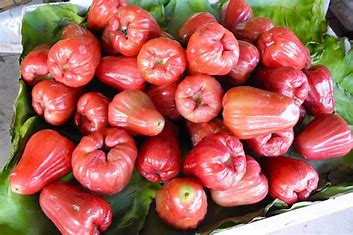Rose apple fruit, known for its refreshing taste and floral aroma, is a tropical fruit that captivates with its unique characteristics and health benefits. This blog delves into the intriguing qualities of Rose apple fruit, examining its nutritional content, therapeutic properties, culinary versatility, and cultural significance. From its origins in Southeast Asia to its growing popularity worldwide, Rose apple fruit offers a delightful blend of flavour and wellness benefits that appeal to fruit enthusiasts and health-conscious individuals alike.
Origins and Distribution of Rose Apple Fruit
Rose apple fruit (Syzygium jambos) originates from Southeast Asia, particularly Malaysia, Indonesia, and the Philippines, where it thrives in warm, tropical climates. Belonging to the Myrtaceae family, Rose apple trees are known for their ornamental appeal and prolific fruit-bearing capabilities. The fruit's name derives from its subtle rose-like aroma and the apple-like shape, although it bears no botanical relation to traditional apples. Over time, Rose apple fruit has gained recognition in global markets for its distinctive flavour and nutritional benefits.
Nutritional Profile of Rose Apple Fruit
Rose apple fruit is celebrated not only for its refreshing taste but also for its nutritional richness. It is a low-calorie fruit that packs essential vitamins, minerals, and antioxidants. A single serving provides a significant dose of vitamin C, which supports immune function and enhances skin health. Additionally, Rose apple fruit contains dietary fiber, aiding digestion and promoting gastrointestinal health. Potassium in Rose apples contributes to cardiovascular health by regulating blood pressure and supporting muscle function.
Health Benefits of Rose Apple Fruit
Incorporating Rose apple fruit into a balanced diet offers various health benefits due to its nutrient composition. The fruit's antioxidant properties help combat oxidative stress, potentially reducing the risk of chronic diseases such as heart disease and cancer. Regular consumption of Rose apples supports hydration and promotes detoxification due to its high water content. Its low glycemic index makes it a suitable choice for individuals managing blood sugar levels, contributing to overall metabolic health.
Culinary Uses and Culinary Delights with Rose Apple Fruit
Rose apple fruit's sweet, crisp flesh lends itself well to both sweet and savoury culinary applications. It is commonly enjoyed fresh as a standalone snack or incorporated into fruit salads and desserts for a refreshing twist. In Southeast Asian cuisines, Rose apples feature in traditional dishes such as chutneys, jams, and preserves, where their floral notes enhance the flavour profile. The fruit's versatility extends to beverages, where it is used to infuse teas, juices, and cocktails with its aromatic essence.
Cultural Significance and Symbolism
Rose apple fruit holds cultural significance in regions where it is cultivated, symbolizing purity, prosperity, and hospitality. In countries like Thailand and Vietnam, Rose apples are featured in religious ceremonies, weddings, and festive celebrations as offerings to deities or guests. Its inclusion in local folklore and cultural traditions underscores its symbolic importance as a harbinger of good fortune and communal harmony.
Global Market Trends and Popularity
Rose apple fruit's appeal has transcended its native regions, gaining popularity in international markets for its unique flavour profile and health benefits. Its availability in specialty fruit stores, farmers' markets, and online platforms has made it accessible to consumers seeking exotic and nutritious food choices. The growing demand for Rose apples reflects global culinary trends towards diverse, sustainable, and health-conscious eating habits.
Sustainability Practices in Rose Apple Farming
As consumer demand for Rose apple fruit grows, sustainable farming practices play a vital role in ensuring its cultivation's environmental and economic sustainability. Responsible agricultural techniques, including organic farming methods and water conservation practices, help preserve natural ecosystems and biodiversity in tropical regions. Collaboration between farmers, governmental bodies, and environmental organizations promotes sustainable agriculture practices that support Rose apple cultivation's long-term viability.
Conclusion
In conclusion, Rose apple fruit stands out for its enticing aroma, refreshing taste, and nutritional benefits that appeal to discerning palates and health-conscious consumers worldwide. Whether enjoyed fresh, incorporated into culinary creations, or celebrated in cultural traditions, Rose apple fruit continues to charm with its versatility and therapeutic properties. As global interest in exotic fruits grows, Rose apple fruit remains a symbol of tropical allure and culinary innovation in today's diverse gastronomic landscape.

.jpeg)
.jpeg)


No comments:
Post a Comment
Thank you for reading my blog